
30 minute read
Peter Kanoa (OM 1969
The life of Peter Kanoa
Peter Kanoa winning a sprint race at the 1966 House Sports (Archives image no. 000269) Right: Peter Kanoa holding the Indigenous flag, together with his wife, Linda, at a Land Rights March in 1976, the first of its kind in central Australia. Thank you to the Honourable David Parsons (OM 1968) and the Honourable Geoff Eames AM QC for their assistance with providing this image. During last year’s highly successful March 50-year reunion of the 1969 cohort, amidst the chatter, one incessant question was also heard:
“Where’s Kanoa?” That was fellow student
Peter Kanoa (OM 1969), an Indigenous
Australian from Heywood in southwest Victoria who spent seven years at
Melbourne Grammar School.
Tragically, no one knew that Peter had died a few months before in September 2018 from kidney failure, aged 66.
Peter, believed to be the School’s first Indigenous student, was a forerunner of Melbourne Grammar’s Indigenous program. Universally popular, he was a superb athlete – unbeatable as a sprinter in his years at the School and a dynamic, charismatic footballer.
Having completed Leaving, Peter left school after 1969 – and thus began his multi-directional life as social activist, community leader, musician, bicycle and motorbike fan, family man and patriarch, and Indigenous elder.
An encounter with Jim Berg from the Aboriginal Legal Service led Peter to a field officer’s job with the service in Fitzroy in the early 1970s – and Peter’s life course was set.
Mr Berg and then lawyer, The Honourable David Parsons (OM 1968), urged him to take an administrative position with the Central Australian Aboriginal Legal Service in Alice Springs in 1975.
For the young urban activist, it was a new experience, learning about his people’s “spiritual belonging to the land, not OWNING the land”, he told radio broadcaster, Jon Faine, in an ABC interview in 1993. He attended bush courts which were up to six hours flight from Alice Springs. “You felt you were in a different world,” he said. It was also a time of the growing land rights movement.
Further jobs in Indigenous affairs came after his return to Melbourne. He was involved in setting up the Victorian Aboriginal Child Care Agency (VACCA) in the early 1980s, becoming program director/chief executive from 1987 to 1992.
In 1991, Peter took leave for four years to study law at the University of Melbourne, then returned to VACCA from 1996-97 as CEO, setting up youth homeless and crisis centres in Melbourne and country Victoria. “He was tireless in ensuring that children remained connected to their family, community and culture,” said his nephew Tim Kanoa in his eulogy at Peter’s funeral. “There are many people in the community who have told the family, that if it were not for Uncle Peter, they would not know who they are.”
He was the boss. During one robust and fierce work discussion, Peter was not contributing, just sitting and listening in. “Now after 10 minutes, Uncle Peter leaned forward, everyone stopped to listen”, said Tim. “He said, ‘Now we are going to do this, this and this’, and looked at me straight in the eye, eyebrows raised, and said, ‘Ain’t that right neph?’’’ Tim agreed!
Peter loved music, “plucking that bass, strumming that guitar” and singing with “that big powerful voice”, Tim said. He wrote songs, played in bands, did solo stints, played bass for a short time with the Warumpi Band, appearing on TV; and played in a support band for Prince at the Sydney Cricket Ground.
Music was also politics; Peter was part of The Black Arm Band, formed in 2006, which joined with the Melbourne Symphony Orchestra in a show, ‘Hidden Republic’. It also toured as part of the Cultural Olympiad connected with the 2010 Winter Olympic Games in Vancouver, where Peter met the Four Chiefs of the Four Nations of Vancouver. Reflecting on Peter’s music career, “the best performances were those sitting around with family with Uncle Peter and his councils and nephews playing (Bob Marley’s) ‘No Women No Cry’,” Tim said.
A ‘69er’, Peter was smitten with a famous film of that year, ‘Easy Rider’; all he wanted to do after seeing that was get on a Harley Davidson motor bike and ride up the centre of Australia. Work and family made that impossible, but in 2012, he got his motorbike licence, bought a motor bike and achieved that lifelong dream.
His love of movies never left him. “It didn’t matter whose house it was, Uncle Peter would also gain control of the TV remote,” said Tim.
Tragedy also struck; Peter lost his first wife Linda in a car accident, but two subsequent marriages produced five children, then ten grandchildren and even two great grandchildren. “He was always big on family, making sure his children knew who they were, what their cultural identity is,” said Tim.
In the late 1990s, Peter, ‘a Gunditjmara and Bunitj Man’, formally changed his surname to his original family name Rotumah. Peter’s grandfather Etike was from Rotuma, one of the Fiji Islands. Etike came to Australia, adding an ‘H’ to the name to anglicise it, and married a local. He gave his son, Peter (Peter’s father) his traditional Rotuman name ‘Kanoa’, which means the ‘Free One’ or ‘Free Spirit’. Towards the end of his life, Peter became unwell. “However, he stayed absolutely true to himself and his values,” said Tim. “He never complained, he took it as it came, ‘One day at a time’, he said. He was humble, he was content, he knew that he had achieved all he set out to do.”
Peter, whose Indigenous name was Peter Wallabulla Amunba Amut Rotumah, was buried at the Weerona Cemetery, Greenvale on 11 October 2018. Hundreds of people attended the funeral. “He was tireless and strong in supporting Aboriginal families and children,” said VACCA chief executive Muriel Bamblett. “Peter will be remembered for his joyous and generous attitude to life.”
Philip Hopkins

You can read an extended version of this article at news.mgs.vic.edu.au SEARCH: ‘KANOA’
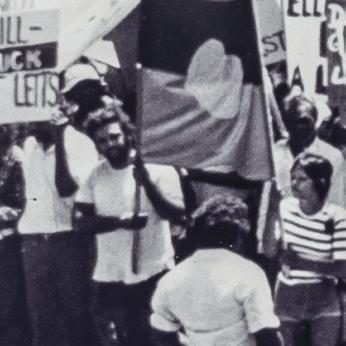
About Philip Hopkins
Philip Hopkins (OM 1970) was a contemporary of Peter Kanoa at Melbourne Grammar School, playing with him in football which he captained in 1970 and as members of the Athletics team. Both boarders at the School, Peter was in Perry House and Philip was ultimately Captain of School House.
Philip has been a journalist for 40 years, having worked in his native Gippsland and Latrobe Valley before joining The Age, where he worked for 25 years, serving on the Foreign Desk and in the Business section.
He has degrees in German, Politics and Russian and a Master of Arts in European Studies from Monash University.
COVID-19 timeline An overview of COVID-19 related events at the School during 2020.
3 JANUARY China reports a cluster of viral pneumonia of unknown cause cases to the World Health Organisation (WHO) 11 MARCH WHO declares COVID-19 a pandemic
27 JANUARY Melbourne Grammar advises students, parents and staff not to enter campuses if they have been in areas of China in past two weeks or in close contact with someone who has been there
DURING JANUARY Outbreak spreads across China and to other countries 30 JANUARY WHO declares global health emergency 16 MARCH Victorian Premier Daniel Andrews declares a state of emergency and introduces new preventative measures including requirements to stay at home
Australian stock markets suffer greatest single day fall ever 17 APRIL All students commence Term II classes in off-campus mode
23 MARCH All students commence off-campus learning 26 MARCH School launches COVID-19 Resource Hub 9 JUNE Students in Years 3 – 10 return to on-campus learning
12 JUNE School launches Annual Appeal seeking support for families finanically impacted by the pandemic. Raises largest amount in recent history
JANUARY
25 JANUARY Australia confirms its first cases FEBRUARY
2 FEBRUARY Global air travel begins to be restricted
The health and wellbeing of members of the Melbourne Grammar School community, and those beyond, is our highest concern.
Email to School community members from the Chair of Council and the Headmaster, 7 April 2020 MARCH APRIL MAY JUNE
18 MARCH 8 APRIL Boarders begin School Council exodus from advises rebates Boarding Houses will apply to Term II School Fees
26 MAY 16 MARCH Students in Prep and Years 1, 2, 11 Cancellations announced, until and 12 return to further notice: on-campus - remainder of APS Summer learning. sports season, including APS No visitors allowed
Swimming/Diving Finals, Head on campus. of the River and National Rowing
Championships - assemblies, House assemblies, chapel services, concerts, large musical groups, VIA program, parent teacher nights and school social functions - interstate and overseas trips - upcoming LGR and other camps
23 JULY Mandatory face covering commences in metropolitan Melbourne
23 JULY All staff and students aged 12 and over required to wear a mask when on campus. Mask may be removed when teaching. School Council advises that rebates will apply to School Fees for Term III, 2020. Year 10 Beyond the Gates (BTG) program cancelled.
1 OCTOBER School Council advises rebates will apply to some School Fees for Term IV, 2020 Flexibility, optimism, generosity and genuine care for others are all traits I think will be important as we move through the next weeks and months.
I am sure you will join me in reassuring children that, although some things are changing, many things remain constant – in particular, our care and your love for them.
From the Headmaster, Parent Bulletin, 19 March 2020
12 OCTOBER Students in Prep - Year 7 and Years 11 and 12 return to on-campus learning
2 AUGUST State of disaster declared across Victoria.
Metropolitan Melbourne moves to Stage 4 lockdown which includes night curfew and additional ‘stay at home’ restrictions
9 NOVEMBER Further relaxation of lockdown rules with travel between metropolitan Melbourne and country Victoria now possible 23 NOVEMBER Victoria/NSW border reopens
JULY AUGUST SEPTEMBER OCTOBER NOVEMBER DECEMBER
5 AUGUST Year 11 and 12 students return to off-campus learning 13 AUGUST APS 2020 Winter Sport season is cancelled.
Cordner Eggleston Cup is cancelled
15 JULY Students in Prep - Year 10 commence off-campus learning
14 JULY Students in Years 11 and 12 commence on-campus classes 24 OCTOBER AFL Grand Final held at the Gabba in Brisbane 10 NOVEMBER VCE exams begin in Victoria, delayed from 28 October
26 OCTOBER Students in Years 8 - 10 return to on-campus learning 28 OCTOBER Further relaxation of some lockdown rules in metropolitan Melbourne 30 DECEMBER VCE results released, delayed from 10 December
14 SEPTEMBER Modest relaxation of some lockdown rules in metropolitan Melbourne
Tackling lockdown fatigue at Wadhurst
COVID-19 presented many opportunities and challenges for students. Our Wadhurst boys spent over 150 days learning from their bedrooms, living rooms or studies – certainly not what anyone is used to. Some embraced the change, while for others, challenges ebbed and flowed.
To combat lockdown fatigue, a three-week initiative was introduced to engage and motivate students as they endured the final stages of offcampus learning. Initially, staff offered one-hour sessions on any area they were passionate about outside their learning area.
“There was such a breadth of activities on offer,” said Wadhurst Deputy Head Dan Newton. “A late afternoon/early evening timeslot allowed for the boys, their siblings and perhaps their parents to join in as well.”
Roles were reversed halfway through the initiative, with students creating activities and running workshops for their peers. “This was a great opportunity for students to take ownership, drive the task and take on a leadership role,” Mr Newton said. “It meant students had to understand the task, determine a method of teaching, deliver the task online and provide feedback to other students.” From general bicycle upkeep and maintenance, understanding stocks, gaining music appreciation through developing Spotify playlists, to cooking up a storm, students were able to listen, learn, move and groove. About 250 participants were involved in any given week, with groups varying in size from five to over 70.
“A student-led activity of drawing flora drew in an intimate group, but it provided such a lovely bonding for these boys,” Mr Newton said. “They had discovered interest in an area that they otherwise wouldn’t have thought about, and now they know a group of other students who share that interest.”
“Students felt like they were learning something for the love of it, not because they had to or because they were being assessed on it,” Mr Newton added. “It was purely to spark interest and curiosity in areas outside the classroom that they otherwise wouldn’t have thought to explore.”
“It doesn’t quite replace the experience of being at School, but it was a fantastic initiative to see students learn something new,” Mr Newton concluded. “Perhaps we might see some of these activities replicated on campus or even added to the Wadhurst curriculum in the future”.
Same, same but different
The final few days of Year 12 at Melbourne Grammar is a celebration of achievement, involvement and friendship.
At Melbourne Grammar, we farewell these students through traditional festivities such as the Valedictory Chapel Service, Ceremony and Dinner, recognising their contribution to the School and enabling them to share their emotions and exuberance with each other.
This year some aspects of Valedictory events were a little different, although the joy mingled with sadness on show each year was ever present.
Students still crossed the stage and received their certificates and prizes from the Headmaster, Mr Philip Grutzner, as part of the Valedictory Ceremony but this was done ahead of time and under COVID safe conditions. This aspect of the Ceremony was recorded, along with the speech from the keynote speaker, Dr Brendan Murphy (OM 1972), former Chief Medical Officer and now Secretary of the Commonwealth Department of Health. These elements formed part of an online event in which families were encouraged to enjoy together at home. One benefit of this approach was that a much wider group of family members were able to be part of the celebrations.
On their final day, the boys walked through a human ‘Avenue of Honour’ to the Old Melburnians War Memorial Hall where they were greeted by the sound of their favourite hymn The Lord of the Dance being played by our Director of Music, Mr Philip Carmody. Here, Mr Andrew Tulloch (OM 1986), President of the Old Melburnians, welcomed the students into the Old Melburnian community.



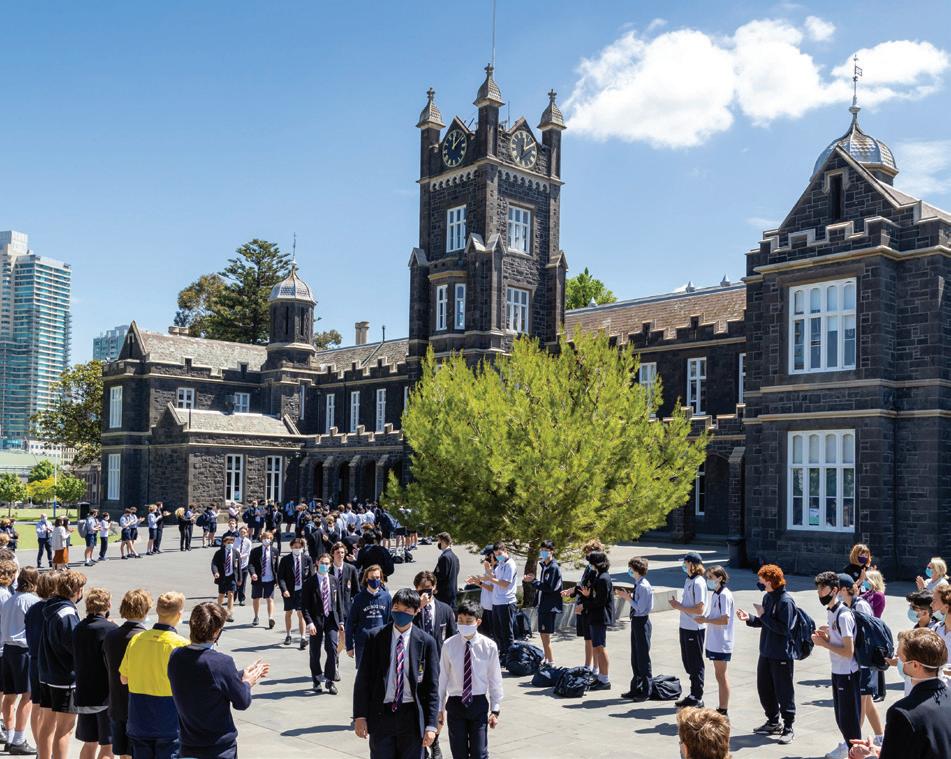

A record of cricketing
As a School, we can celebrate many remarkable performances across our cricketing history. In fact, Melbourne Grammar has won or shared the APS cricket premiership 37 times since the competition commenced in 1891. Here, we look back on a few more of the milestones our cricketers have achieved.

1 A record-breaking partnership
James Sharp (OM 1916) and Robert Herring (OM 1917), pictured left, set the School’s most extraordinary record in 1915. Not only did they make a 345-run partnership, but between them scored 743 of the team’s 961 runs against The Geelong College. This stood for decades as an unbroken world record for a school team. James Sharp’s unbeaten 506 runs included 5 sixes and 77 fours. Robert Herring’s 238 runs was his second double century of the season.
Nearly 90 years after this remarkable feat, our group for parents of School cricketers was aptly named 'The 961 Club'.
Test cricket successes
Two Old Melburnians have been selected for the Australian Test team. Jack Barrett (OM 1876) played in two Test matches in England in 1890. He was the first to bat right through a Test match innings (2nd innings, Lords Test 1890).
(Edward) Ted a’Beckett (OM 1926), pictured top right, – a star of the School’s cricket teams that won the premierships in 1925 and 1926 – captained the cricket and football teams in both those years. He took 26 wickets during the 1925 season, and in 1926 made a century and took 35 wickets.
A’Beckett took a wicket with his first ball when he made his debut for Victoria in the 1927/28 season. He went on to play 47 matches for Victoria and four tests for Australia (1928–32) before retiring from first class cricket to work as a solicitor.
Our first class players

At least 56 Old Melburnians have played first class cricket for Victoria, interstate teams, Oxford University, or English county clubs. These include:
Robert Herring (mentioned above) was a member of the First XI for five years (1913–17). He played in the three premiership teams of 1913 to 1915, captained the 1915 side, and later played for Victoria. Edward a’Beckett (OM 1958), son of (Edward) Ted a’Beckett, played in the First XI for three years, including the premiership year of 1957. He captained the team in 1958 and was chosen for the Victorian team in 1966.
Two members of the premiership team of 1920 played for Victoria: Herbert Guthrie (OM 1920) and Harold Austin (OM 1922). Austin also contributed to the First XI premiership teams of 1921 and 1922. Leslie Rainey (OM 1898) was chosen in the First XI for three years, including two premiership years (1896, which he captained, and 1897), and later represented Victoria.
Vallancey Brown (OM 1930) played for Victoria. While at school he had been selected for the First XI that won premierships in 1929 and 1930. 2
Harcourt Dowsley (OM 1937) was chosen for three years in the First XI and captained the 1937 premiership team. In the APS season of 1936, his highest score was 170 and he averaged 61 with the bat – the best in the competition. He represented Victoria from 1937 to 1947.
Val Holten (OM 1945) played in the First XI for two years, including the premiership team of 1944, and represented Victoria during the early 1950s.
Sesquicentenary success
In Melbourne Grammar’s sesquicentennial year, 2008, the cricket team, pictured over page, delivered a perfect gift: an undefeated season achieving the first APS cricket premiership since 1976.
Melbourne Grammar scored 355 runs in the final match against Haileybury College.
James Bett (OM 2009) took 44 wickets for the season, including 8/37 against Scotch College. The 2008 Captain of School and Captain of Cricket, Charles Shaw (OM 2008), scored two centuries in 2008, following on from two in 2007. Louis Cameron (OM 2009), a member of the 2008 team, later played cricket for Victoria. Another member, Alex Keath (OM 2010) also played for Victoria from 2010 to 2015. The Tri-Grammar Shield
Melbourne Grammar also won the Tri-Grammar Shield in the sesquicentennial year. This competition between Brisbane Grammar, Melbourne Grammar and Sydney Grammar commenced in 1998. Since its inception, Melbourne Grammar has won on eleven occasions, with Brisbane Grammar and Sydney Grammar both winning six times. Sydney Grammar and Melbourne Grammar began playing an annual match in 1876, predating the Ashes by more than five years. The first match was held at the Melbourne Cricket Ground. The teams now contend for the trophy ‘The Bat’, created in 1976. Cricket matches have been held between these two rivals almost every year and continue to form part of the Tri-Grammar Cricket Festival. Of the 126 times Melbourne Grammar has played Sydney in these interstate tournaments, they have won 63 times. Sydney Grammar has won 58 times, with four draws and one tie. (No games were held during 1880-82, 1884, 1915-17, 1930-38 or 1942-44.) These interstate matches witnessed some remarkable performances:
Alex Keath (OM 2010) made 200 not out against Brisbane
Grammar in 2009.
In 2006, Daniel Sartori (OM 2006) scored 200 and took 4 wickets for 90 runs against Brisbane whilst Bryan Vance (OM 2006) scored 140 against Sydney in the same year. Max Stevenson (OM 2019) made a match-winning score of 162 against Sydney in 2019, which is the highest score against Sydney by a Melbourne Grammar player.
Other notable achievements
In 1876, Hugh Ross (OM 1876), pictured right, took 18 wickets for 58 runs in one match against Scotch College. In 1923, Bruce Dunlop (OM 1923) and James Bryant (OM 1923) made a 367 run partnership against The against Haileybury in 2006/07 and
Geelong College. In 1976, when Melbourne Grammar won the premiership, bowler Mike Davis (OM 1977) bagged 34 wickets, including 7/72 against St Kevin’s College. Spinner John Thomson (OM 1976) took 7/61 against The Geelong College, and Craig Henderson (OM 1976) made 163 runs against Xavier College. In 2000/01, Owen Webb (OM 2001) scored three centuries with a highest score of 144 against Wesley College. In 2005/06, Captain of Cricket Bryan Vance (OM 2006) scored six centuries with a highest score of 204 against Xavier College. He finished the season with 799 runs at an average of 88.8. In the same season, Daniel Sartori (OM 2006) scored four centuries including two double centuries with a highest of 201 against St Kevin’s College. Tom Corker (OM 2006) scored two centuries and featured in a 316-run partnership with Bryan Vance against Xavier College. Although the team was one of the School’s strongest in recent times, Melbourne Grammar lost the premiership to Haileybury College Jack Slade (OM 2007) took 7/66
by one point. Joshua Skala (OM 2010) scored three centuries in 2008/09 with a highest score of 130 against Brighton Grammar School. In addition to his interstate success, Alex Keath (OM 2010) scored two centuries in 2009/10.
Zach Merrett (OM 2013) scored two centuries in 2012/13.
Edward Faulkner (OM 2016) took 7/24 in the last match of the 2015/16 season against Scotch College to help clinch the premiership. Max Stevenson (OM 2019) made four centuries as well as taking 5/41, including a hat trick, against Geelong College. He scored 633 runs at an average of 90.4 to top the APS average for the season.
A new scoreboard
The First XI have largely played their home games on the Main Oval. A new electronic scoreboard was unveiled in September 2018. Named in honour of Angus Mackay (OM 1952), the 1952 Captain of Cricket and a School benefactor, it is a state-of-the-art instrument.
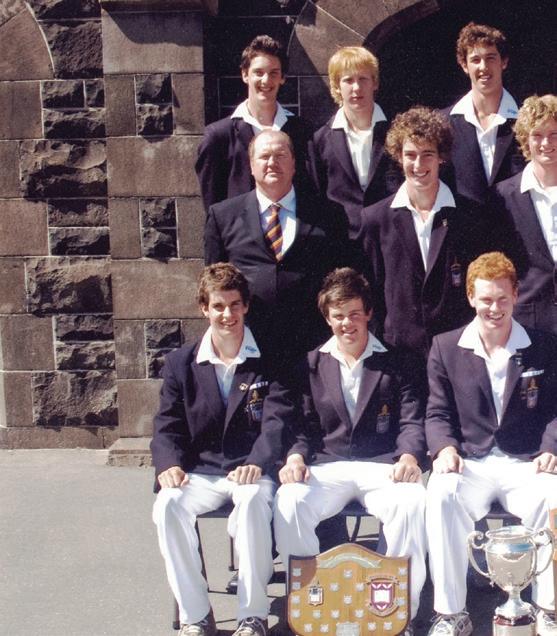
International tours
International cricket tours to England began in 1993, with trips every two years after that. The three-week tours included regular games against schools such as Eton, Harrow, Wellington, Eastbourne, Lancing and Bedford as well as games against Urchfont Village in Wiltshire and the Royal Household at Windsor. A tour of Lords, the home of cricket – alongside seeing international games there and at other test venues – were highlights of the trips.
Other tours included games in Ireland, Scotland, Wales and on Guernsey and Jersey Islands, allowing our teams to play cricket on overseas pitches and connect with other schools’ rich histories.
Staff involvement
Staff have made notable contributions to the success of cricket at Melbourne Grammar. Noel Austin (OM 1937), a member of the 1937 premiership team, went on to teach at Melbourne Grammar (1941–82) as the Head of Classics, and also as the Master in Charge of the First XI from 1952 to 1972. During that time the School won premierships in 1957, 1959 and 1965.
From 1999, Mathematics and Chemistry teacher Dr Marcus Richards was the Teacher in Charge of Cricket for 20 years. Under his leadership, Melbourne Grammar won two premierships in 2008 and 2016 and finished second six times, three of these by only one point. In addition to coaching the Second XI for 17 years, Dr Richards fielded over 200 teams in APS competitions and was involved in five England Cricket Tours and 20 Tri-Grammar Cricket Festivals, seven of which he organised and hosted.

3 4
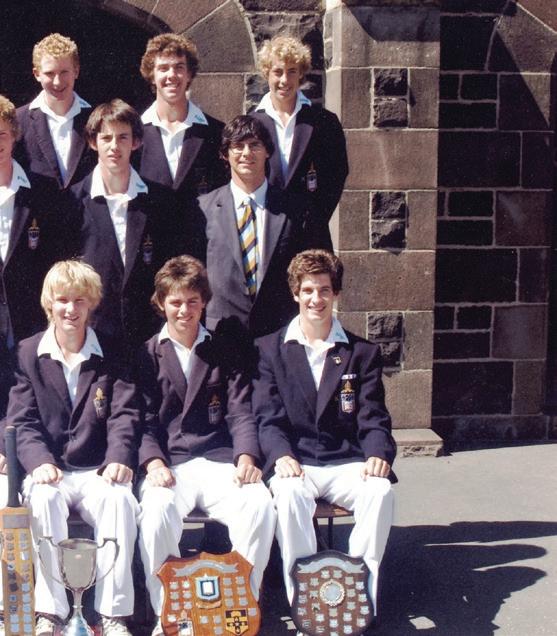

1- From left: J.C. Sharp and
R.W. Herring,1915 (Archives image no. 000992) 2- First XI, 1926 Premiers.
From left: R.R. Renowden,
B.H. Trend, H.R. McCrae,
P.F.V. Turner Esq., W.H.
Millear, J.C. Campbell and
F.W. Farrier, P.O. Graham,
L.R. Vollugi, J.S. Morell (Vice-Captain), E.L. a’Beckett (Captain), A.M. WIllis and
C.N. Austin (Archives image no. 005937) 3- First XI, 2008 APS Premiers and Champions. Back row (from left): M.A.K. Wilson,
J.R.A. Bett, N.D. Voyage,
H.W. Trotter, T.R. Morris and L. Cameron. Middle row: Mr M. Ford (coach),
R. Mitchell, A. Keath, L.J.G
Cameron and Mr G. Lohhead (coach). Front row: J.K.
Land, R.J. Thomas, C.E.
Shaw (Captain), L.F. Gooley,
W.H.A. Payne and S.R. Land. (Archives image no. 004829) 4- Match at the Melbourne
Grammar School ground against Geelong Grammar
School. Melbourne Grammar is batting. Photograph taken from Witherby tower, 1888. (Archives image no. 000494) 5 - First XI, 1876. Standing (from left): G.R. Buckley,
C.Y. Shuter, J.W.B. Amess,
H.M.P. Ross, F.G. Smith (Captain), T.D. Watson,
G.F. Wright, F.S. Stephen and H.A. Smith.
Front: E.S. Herring,
W.A. Menzies and
R.M. Watson. (Archives image no. 001053)
5
A quarter century of service
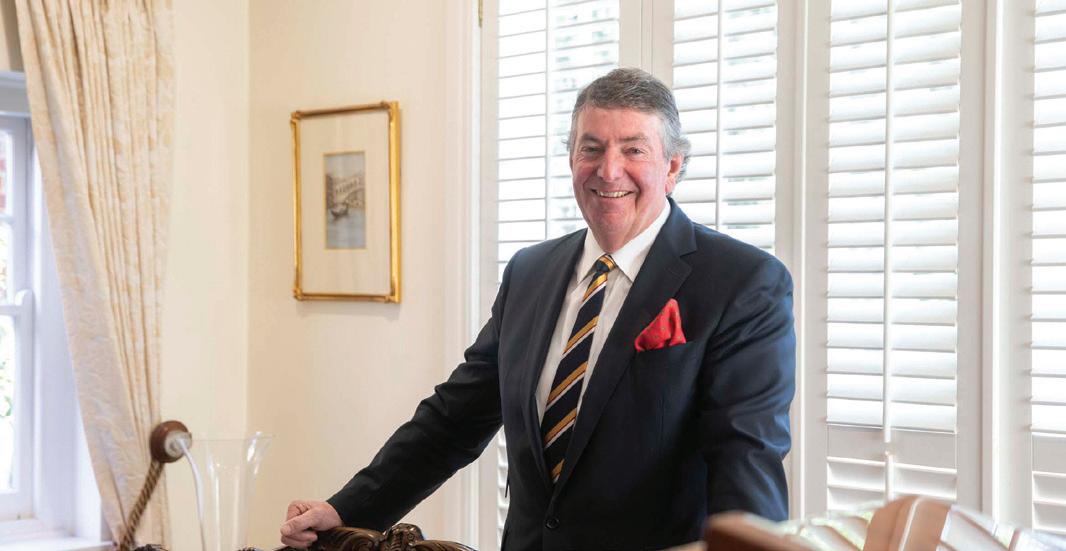
School Council Deputy Chairman, Lloyd Thomas steps away after 25 years of service to Melbourne Grammar School this year, leaving a legacy that highlights the impact volunteers can have on the School. According to Lloyd, involvement in the school is not a case of ‘giving back’ but, more importantly, ‘putting in’ and this is something everyone can do.
Lloyd was a member of School Council from 2008 until retiring from the role this year. He was also President of the Melbourne Grammar School Foundation Board from 2009 to 2017, having served on that Board for 19 years. In this capacity, he was instrumental in realising the Geoff Handbury Science and Technology Hub, arguably one of the finest buildings of its kind in Australia. Over the years, he has led countless fundraising efforts, both small and large, all with an intended agenda to grow the philanthropic culture of the School.
“Lloyd’s service is singular,” says Philip Solomon who took over from Lloyd as President of the Foundation Board in 2017. “In addition to being an exemplary leader, he offered his time and energy with extraordinary generosity. Raising money involves shoe leather, and he wore his out on behalf of the School.” Lloyd has an intergenerational connection to Melbourne Grammar, with three sons already graduated and two grandchildren currently attending the School. His wife, Debbie, has also been a strong supporter of the School, serving as President of Friends of Grammar in 1996 and, together with Lloyd, being a generous donor to the School. But Lloyd sees his role in supporting the School extending far beyond these family ties.
“The pursuit of excellence in education here in Australia requires the likes of Melbourne Grammar,” Lloyd says. “If the School pursues and delivers excellence, this raises the bar for education more generally.”
This belief in the intrinsic value of education has been a key motivator for Lloyd’s leadership, particularly when it came to developing the four fundraising pillars that shape our current philanthropic priorities. “You can’t say you’re a highquality school unless you deliver quality across all areas,” Lloyd explains. “The Foundation Board and School Council was committed to making sure we could support buildings and grounds, continue the success of the bequests program, create an Indigenous bursary program that would lead to great outcomes and create scholarships that would increase diversity among our student population – all of which will always be important in underpinning a Melbourne Grammar education.”
To those considering making their own contribution to the School, either financially or through their time, Lloyd says the rewards are both immediate and long-term. “What excites most people is the ability to see progress – to invest in something and see that their effort is making a difference,” he says. “Melbourne Grammar continues to make impressive progress and, importantly, still has significant work it can do to contribute to Australian education.”
Lloyd and Debbie are both members of the Witherby Tower Society, a group for those who have indicated they will leave a bequest to the School.
You can read more about Lloyd’s contribution to Melbourne Grammar School in the ‘From the School Council’ article on page 4.
A focus on community
In keeping with the theme of 2020, Friends of Grammar had a year like no other!
The year started as expected with the usual flurry of activity. At Senior School, we held our welcome events, including a giant sausage sizzle, morning teas and cocktail parties. And then the pandemic hit, and our priority turned to supporting the community, requiring some creative thinking in the absence of traditional get-togethers. Fortunately, we live in an age of technology, and as we rapidly adjusted to life over Zoom and Webex, we found new ways to engage and connect virtually.
The Year 12 community was an area of focus. We distributed ‘Care Packs’ to students, Morning Tea Boxes to mark exams, and we supported the School with ‘Bluestone Dreaming’, a book paying tribute to the Class of 2020. The Year 9, 10 and 11 students were not forgotten as we celebrated their return to campus in Term IV with doughnuts and coffee carts for students and staff. With Wadhurst welcoming another 100 new families, it was wonderful that we were able to successfully hold all Term I events to help with this transition. We remained in contact with our families once learning moved off-campus and virtual coffee mornings became the norm. We did not let the Father/ Son Trivia night go by the wayside, bringing a virtual Trivia Night to the community instead. During the final part of the school year our purpose was to slowly bring the Wadhurst community together again after many months apart.

FOG Grimwade House hit the ground running in Term I with a dizzying array of coffee carts, cocktail parties and the summer picnic, all opportunities to catch up for a laugh with old and new friends. Term II looked very different as we faced new challenges. FOGG seized the opportunity to support and connect in any way possible, which included collaborating with the uniform shop to offer click & collect, coordinating teacher thank yous in inventive ways and year level Zoom Discos. We were grateful and humbled to witness the community rallying to support and catch up on a local level.

Friends of Grammar would like to thank our fabulous volunteers and wonderful families for their unfailing support throughout the year. While 2020 did not go as expected, we came through it together as a community.
Madeline O’Connor, Vanessa Leviny and Jo Harris, FOG Presidents 2020

Continuing to connect
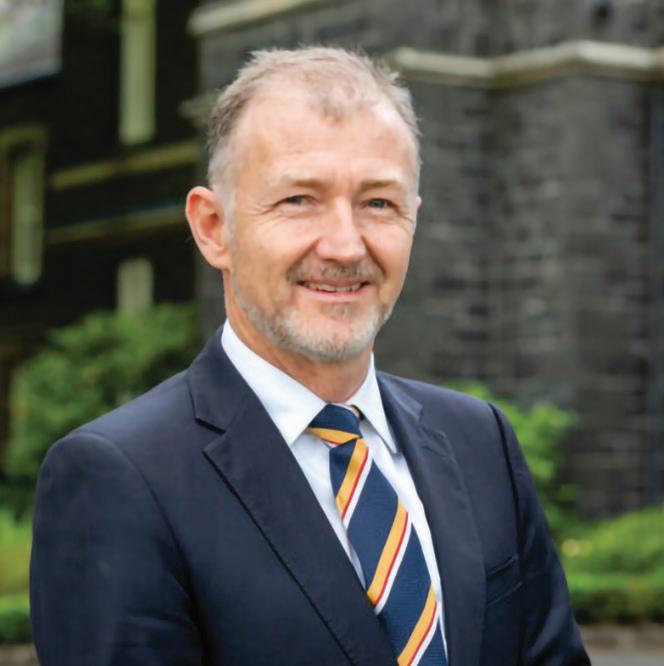
Andrew Tulloch
In 2020 the COVID-19 virus has impacted many of the traditional activities of the Old Melburnians
Society and illustrated the importance of our core purpose – to foster goodwill amongst the alumni of Melbourne
Grammar School and to support the welfare of the school.
The Old Melburnians Society comprises 15,000 alumni, spanning generations and locations across the world. Fostering goodwill amongst such a diverse body is not easy in normal times, let alone in the midst of a pandemic with restrictions on movement and gatherings.
However it would appear the sense of community is strong amongst Old Melburnians. We have had a series of successful webinar events which have been well attended.
We also instituted a new ‘Gold Star’ program in response to the pandemic to support our senior Old Melburnians. Through the Gold Star initiative we became aware of the wonderful work being done by David Winter (OM 1972) running a Meals on Wheels program in Surrey Hills, and now have a number of OM volunteers helping David. In 2020 we adjusted our mentoring program into the ‘Blue Star’ program under the leadership of council member Bill Cowan (OM 1963) where mid-career OMs can advise early career OMs on navigating an economic downturn. There has been a very positive response from older OMs to assist and fifteen younger OMs are benefiting from their experience. This program will continue to be valuable in 2021 with the prospect of further disruption to the economy and careers.
As we look to 2021 we hope we can retain this strong sense of community and volunteering that has been so important in 2020. We also seek to build our engagement with OMs who may have lost contact with the Society. If you are at all unsure whether we have your current email address please email mgs@mgs.vic.gov.au or visit mgs.vic.edu.au/update-details We also plan to help our many Old Melburnians’ affiliated clubs restart in 2021, including drama, football, cricket, hockey, soccer and athletics. The interruption to community sport and performance is a challenge across the State and we will support our clubs getting back on their feet, including the OMFC which was unable to fully celebrate its centenary in 2020. The Old Melburnians also looks forward to welcoming our next cohort, the Class of 2020. There is no doubt this year group will have a special place in the Old Melburnians, having had a Year 12 experience like no other. We recognise the resilience and dedication of the Year 12 boys in 2020 and hope to see as many as possible participate in Old Melburnians activities next year. We commend the School for its support of the students in a very challenging year.
Andrew Tulloch President of the Old Melburnians
Old Melburnians Dick Cotton Fellowship
The 2020 Dick Cotton Fellowship was awarded to Olivia Vizard (OM 2015) who is teaching at Tennant Creek in the Northern Territory.
The Fellowship will help Olivia establish a program for Tennant Creek students to learn skills about radio and broadcast on the Tennant Creek community radio station.
The students are predominantly indigenous and the opportunity to produce radio programs will be a point of pride for their extended families and community.
Further information is available at: mgs.vic.edu.au/om-fellowship
OBITUARIES
The School has learnt of the following deaths in our community. We extend our sympathy to their families and friends.
Abraham, P L (OM 1960) Annois, R F L (OM 1946) Baillieu, G W (OM 1952) Brockhoff, J A (OM 1948) Brookes, C H (OM 1947) Capp AM, W B (OM 1951) Clayfield, I L (OM 1948) de Winter, I L (OM 1951) Dunn, R M (OM 1957) Dyer, S C (OM 1994) Edwards, B C (OM 1942) Falconer, S C (OM 1976) Floyd, J H A (OM 1938) Flude, A J (OM 1963) Fox, R J M (OM 1960) Goddard, B H (OM 948) Henderson, G D (OM 1970) Holloway, A (OM 1946) Johnston, A H (OM 1964) Johnston, J R (OM 1948) Last, R C (OM 1948) Lauer, A L (OM 1953) Longney, T P (OM 1959) Martin AM, I G (OM 1944) McCreadie, D K (OM 1982) McDonald, C K, (OM 1965) McNamara, P J C (OM 1956) Mercer, G M (OM 1966) Montgomery, I Y (OM 1952) Moran OAM, R G (OM 1951) Munro, R I (OM 1945) Nash, J A (OM 1954) Ng, E K (OM 1998) Ress, L (OM 1945) Riches, P W (OM 1957) Robert OAM, G E (OM 1948) Rowe, R L (OM 1952) Scales, J D (OM 1949) Scales, P J (OM 1947) Smith, P R L (OM 1962) Schwarz, P L (OM 1946) Staughton, P S (OM 1948) Sutterby, B (Current Parent) Turnbull, D A (OM 1976) Walker, J M (OM 1952) Warner, C A (OM 1971) Webb, G A (OM 1956) Williams, W McB (OM 1945) Wittner, Z (Current Parent) Wood, J J (OM 1954)
Do you have a recent obituary to report?
Please contact us if you are aware of a death in the Melbourne Grammar School community.
mgs@mgs.vic.edu.au
FEATURED ARTWORK
Artwork by Ethan Richards, Year 11 This digital design was developed as part of a study into Pop Art in Year 11 Visual Communication Design. Visit The Art Gallery to view additional compositions created in this subject, as well as other pieces from different year levels.

The Art Gallery showcases student artwork from across the School. Hosting mini-exhibitions, The Art Gallery highlights the steps students take while at Melbourne Grammar School towards a unique student portfolio, as well as building a deeper connection with art in all its forms.
news.mgs.vic.edu.au/the-art-gallery
Melbourne Grammar School 355 St Kilda Road, Melbourne Victoria 3004 Australia +61 3 9865 7555 | mgs@mgs.vic.edu.au

